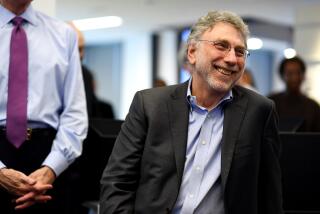Alexander Cockburn dies at 71; radical longtime columnist
Los Angeles Times
Alexander Cockburn, the radical and acerbic journalist who had written longtime columns in both the conservative Wall Street Journal and the leftist outlet the Nation, died Friday in Germany. He was 71.
The influential writer had been fighting cancer, according to his editor, Katrina vanden Heuvel.
Unlike another prominent writer, Christopher Hitchens, with whom he had often been compared, Cockburn did not share the story of his illness. It was a rare quiet move in a career characterized by a thirst for public debate.
For 28 years, Cockburn wrote the Beat the Devil column in the Nation. His last column for the publication will appear July 30.
“Alexander reveled in being a troublemaker, and his provocative, polemical, elegant style usually engaged us and his reporting and analysis opened windows onto under-unreported news,” Vanden Heuvel, the Nation’s editor and publisher, said in an email to The Times. “I often felt I wasn’t doing my job right if we didn’t get a dozen or so subscription cancellations as a result of some Cockburn column.”
Cockburn was born June 6, 1941, in Scotland, the son of writer Claud Cockburn. He was raised in Ireland and graduated from Oxford University in 1963 with a degree in English literature and language. He began his journalism career in England before moving to the U.S. in 1973.
He settled in New York, where he began writing a ground-breaking column for the Village Voice critiquing mainstream media.
“His legacy was his commitment to truth, his disgust at the pretense of objectivity, his belief that every piece of writing had an ideological slant, and that you had to admit it,” Amy Wilentz, a contributing editor at the Nation, told The Times in an email.
Cockburn, who had been critical ofIsrael’spolicies, was fired from the Village Voice in 1984 after it was learned that he had accepted $10,000 from a group described as pro-Arab. Cockburn said the money was for a book deal.
Like Hitchens, Cockburn began his career as a public intellectual as a radical leftist, then drifted. Both found that the pursuit of independent thought led to points of view that ran counter to those held by their allies. In Cockburn’s case, a major issue that rankled leftists was his denial of global warming, which brought him a measure of public attention in 2007.
In recent years, Cockburn had receded from his previously prominent place in the public forum. “He had the intellectual firepower to do anything he wanted,” said writer Marc Cooper, a former colleague who had a falling out with Cockburn. “He forfeited becoming a very influential writer in favor of becoming a mud-throwing polemicist.”
In 1994, Cockburn helped found Counterpunch, a newsletter and website, which spoke directly to those who shared his beliefs. Some, like Cooper, saw this as a rhetorical and intellectual dead end. Cockburn continued to co-edited Counterpunch with Jeffrey St. Clair.
Cockburn was the author of several books, including “Whiteout: The CIA, Drugs and the Press” (1998, with St. Clair) and “A Short History of Fear” (2009).
He is survived by a daughter, Daisy.
Times book critic David L. Ulin contributed to this report.
More to Read
Start your day right
Sign up for Essential California for the L.A. Times biggest news, features and recommendations in your inbox six days a week.
You may occasionally receive promotional content from the Los Angeles Times.







